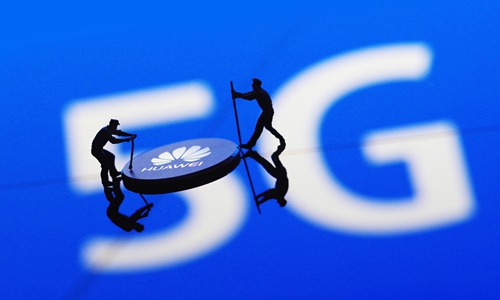HOME >> OPINION
US needs open-mindedness in 5G race with China
By Wang Wenwen Source:Global Times Published: 2019/12/17 19:23:40

Photo: IC
China leads the world's 5G development, which the US calls a race.Earlier this year, US President Donald Trump said, "The race to 5G is on and America must win." The question is, how?
Over the past year, we have seen the US ramp up efforts to squeeze out Chinese tech giant Huawei as a 5G supplier and even pressure its allies to close the door on the Chinese telecommunications company, which aims to force China to retreat or give way to the strategic information, communication and technology industry and use the US dominant supply position as leverage in the global 5G race.
On Monday, the US House passed legislation that would bar the US government from buying telecommunications equipment from companies deemed to be national security threats, including Huawei, citing "malicious foreign interference."
But still, China has embraced 5G at a faster pace. In early November, China rolled out its commercial 5G networks nationwide, and one week later it launched research and development efforts into 6G networks.
Despite the US lead in cutting-edge innovation, American elites are well aware of the fact that their country is falling behind China in 5G. In a recent Washington Post op-ed, Chairman of the Paulson Institute Henry M. Paulson Jr., also former US treasury secretary, acknowledged that "Washington needs to focus not simply on trying to slow China down, but on accelerating efforts at home" to close the gap with China quickly.
Such rethink comes in time, and China can be the very example to the US on how to catch up. China used to be a laggard 40 years ago, but gradually rose to become the world's second-largest economy through state efforts and the hard work of all Chinese people, which the US despises but simply has no way to duplicate. China's response to the US squeeze has been to deepen its domestic market and open it further and to invest more in 5G development.
This is the way China faces up to competition headwinds. On the contrary, the US way is to crack down on others at the cost of its own development. Paulson rightly pointed out that openness has been the comparative advantage of the US, but what is happening in the 5G race is perhaps the start of the US losing its traditional competitive spirit and national advantage.
China used to look to the US during its development. While China still lags behind the US in terms of scientific investment and AI talent, the Chinese government, companies and social sectors have all made scientific input an important budgetary component. The government is also thinking of measures to make the country's scientific strategy facilitate the professional pursuit of individuals.
As both China and the US have recognized 5G as a critical enabler of future competitiveness and the US is poised to catch up, the ball is now in the US court. Will it be open-minded enough to engage in healthy competition with China?
Posted in: OBSERVER